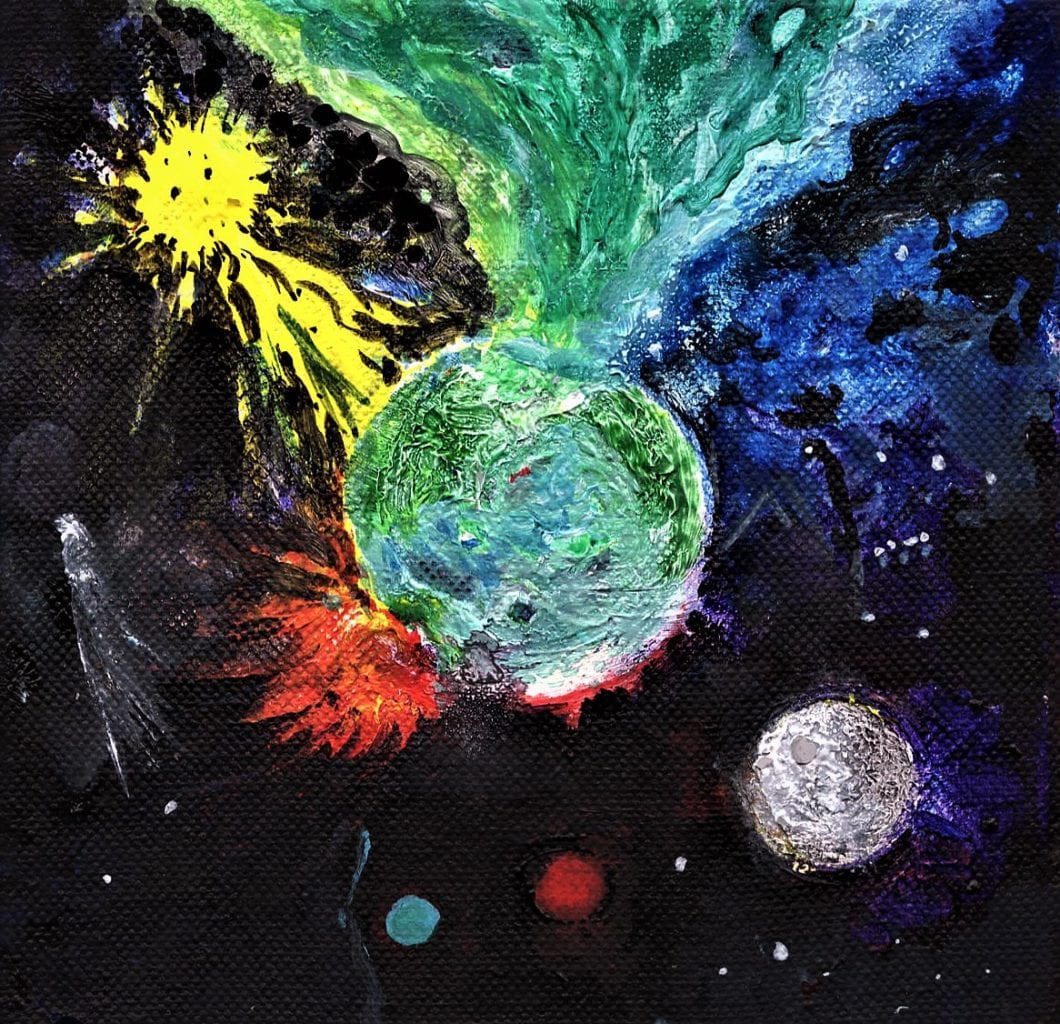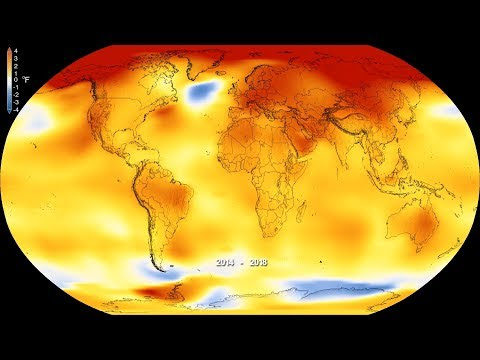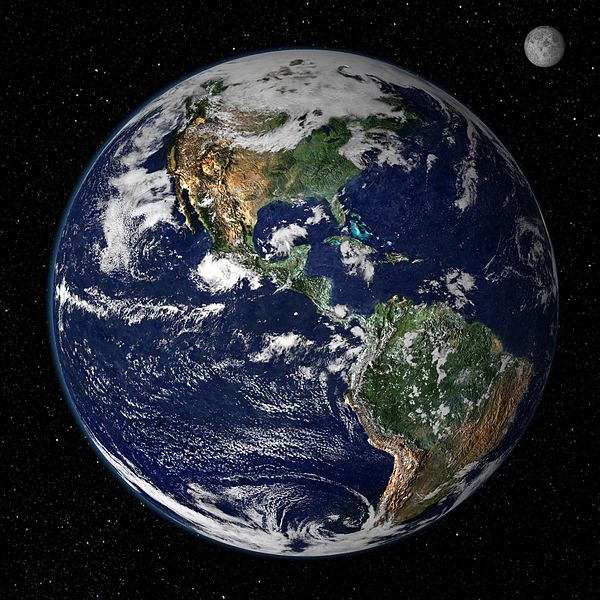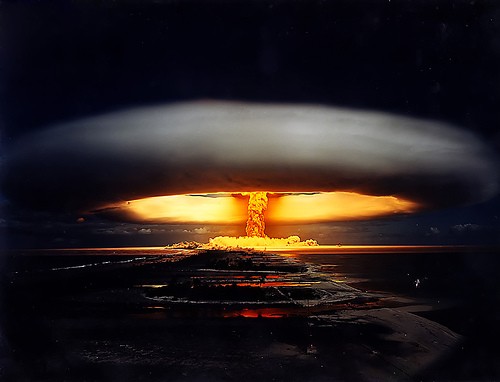
Earth Hanging in the Balance – A New American Journal graphic by Walter Simon [Art Market Place]
By Glynn Wilson –
WASHINGTON, D.C. — So let’s say for the sake of argument that you’re interested in getting involved to help “save the world” or save the planet, or at least help try to keep life livable for humans on Earth, and at the same time, you have an interest in saving some form of democracy in the United States of America and around the world.
If you share our interest in exploring these issues, first we would need to know what the problems are, come up with a list and prioritize them, and then begin to talk about potential solutions. According to various organizations and agencies, including the United Nations, the World Economic Forum, the Central Intelligence Agency and even the Gallup poll, lists have been published for years identifying the problems. The biggest problems tend to fall into three main categories: economic issues, environmental issues and social issues.
If you ask the American public what they think the most important problems are, like Gallup does every year, the most people say economic problems, in the range of 30 to 35 percent, from the economy in general to the high cost of living and inflation at this time, as well as unemployment even though the official unemployment rate is low now. Some mention the gap between the rich and poor, which is clearly an issue that causes other economic problems. Some mention gas prices, although they have been higher. Some bitch about taxes, even though federal income taxes are relatively low. Some mention the federal debt and/or the budget deficit.
If you ask people about non-economic problems, the most people cite poor leadership by the federal government, although people tend to like their own representatives. Some mention immigration as a problem, while some talk about the need to unify the country. Then comes the environment, pollution and climate change. Some say race relations is a big problem, or some form of a collapse in ethics, morality or the decline of the family in society. Others cite problems in the judicial system and the courts, and some talk about problems in our democracy, including problems with elections and the need for election reform. Some identify abortion or crime and violence, or guns. Others point to problems in the health care system or education. A small number of people identify international problems, including the fear of war, including nuclear war. Some name Russia as a threat. Others worry about China or terrorism.
The CIA publishes an annual report called the ANNUAL THREAT ASSESSMENT from the office of the Director of National Intelligence, and for many years now climate change has been at the top of the list, as well as the threat of various wars. Threats from Russia and China are given prominent play, as well as more minor players like Iran and North Korea. Russia’s war on Ukraine is a particular worry now, and the report also talks about the threat of domestic terrorism and the potential loss of our civil liberties.
The United Nations publishes an annual SPECIAL REPORT ON HUMAN SECURITY, in which it emphasizes the existence of a new geological age in history, the “Anthropocene,” viewed as the period during which human activity has been the dominant influence on climate and the environment. All the issues related to climate change tend to dominate this report, along with the economic and social problems caused by global warming.
The World Economic Forum publishes an annual report on Global Risks, which also places a special emphasis on climate change and environmental problems, which also lead to economic problems and problems in society at large.
If you simply conduct a web search say for “the biggest problems in the world today,” you will turn up a Wikipedia page with a List of global issues. The list includes Biodiversity loss, Climate change, Destructive artificial intelligence, Environmental disasters, Nuclear holocaust, Pandemics, Biotechnology risk, Molecular nanotechnology and even “Societal collapse.”
Problem
1. Since climate change comes up near the top on all the lists, let’s deal with that as first, since it also leads to economic problems and problems in society at large. The World Health Organization calls climate change the “greatest threat to global health in the 21st century.”
In common usage, climate change basically encompasses all the problems associated with the process underway known as global warming due mainly to the burning of fossil fuels for energy and transportation. It is the undisputed ongoing increase in the average temperature around the world, both in the air, on the surface and in the world’s oceans, and its impacts on Earth’s climate system.
Fossil fuel use, deforestation, and some agricultural and industrial practices increase the output of greenhouse gases, mainly carbon dioxide and methane. Greenhouse gases absorb some of the heat that the Earth radiates after it warms from sunlight and trap heat in Earth’s lower atmosphere, causing the global warming trend.
Climate change manifests in a range of impacts on the natural environment. Deserts expand, while heat waves and wildfires become more common. Amplified warming in the Arctic has contributed to melting permafrost, glacial retreat and sea ice loss, and the release of methane. Higher temperatures also lead to more intense storms, tornadoes and hurricanes, along with more devastating droughts and other weather extremes. Rapid environmental change in mountains, coral reefs, and the Arctic is forcing many species to relocate or face extinction.
Even if efforts to minimize future warming are successful, some effects will continue for decades like ocean heating, acidification and rising sea levels.
Climate change threatens people with increased flooding, extreme heat, increased food and water scarcity, more disease, and economic loss. Human migration and conflict can also be a result — a phenomenon that is expected to increase as the global population goes from 8 billion to 9 billion by 2035.
Societies and ecosystems will experience even more severe risks unless drastic action is taken to limit warming. Adapting to climate change through efforts like flood control measures or drought-resistant crops may partially reduce climate change risks, although some limits to adaptation have already been reached. Poorer communities are responsible for a small share of global emissions, yet have the least ability to adapt and are most vulnerable to the impacts of climate change.
Many climate change impacts are already here, at the level we already face, a 1.2 degrees C (2.2 degrees F) level of warming since the beginning of the Industrial Revolution. Additional warming will increase these impacts and trigger tipping points, when things will get drastically worse fast, like the melting of the Greenland ice sheet.
We know, for example, that “August 2023 is the warmest month of August in the … data record, as well as the second warmest month (ever recorded) after July 2023,” according to the Copernicus Climate Change Service.
Summer 2023 Ranks as the Hottest on Record ‘By a Large Margin’

Earth’s long-term warming trend can be seen in this visualization of NASA’s global temperature record, which shows how the planet’s temperatures are changing over time, compared to a baseline average from 1951 to 1980. The record is shown as a running five-year average: NASA’s Scientific Visualization Studio/Kathryn Mersmann
Solution
Since we know what causes global warming and climate change, naming the solution is simple: Stop burning fossil fuels such as coal, oil and gas for energy and transportation. Implementing a solution is the hard part, and will take time. How much time do we have? Not much.
Under the 2015 Paris Agreement, nations collectively agreed to keep warming well under 2 degrees C. However, with pledges made under the agreement, global warming would still reach about 2.7 degrees C (4.9 degrees F) by the end of the century. Limiting warming to 1.5 degrees C will require halving emissions by 2030 and achieving net-zero emissions by 2050.
In the United States, the Biden administration is working on the solution, while the MAGA Republicans in the House and Republican presidential candidates who want to run against Biden are trying to do everything they can to work against a solution, even to the point of denying that the problem exists at all.
A new report out this week put together as a requirement in the Inflation Reduction Act claims that President Biden’s new law, billed as “the largest climate investment ever,” spurs major carbon dioxide emission reductions from the electricity sector and across the economy in the United States.
So at least we are working on a solution in this country. Let’s hope future elections do not derail all the progress made here.
In a very real sense, protecting democracy appears to be a prerequisite to preserving life on Earth. It should be clear to all by now that those who value democratic elections are most likely to work for a solution to climate change, while those who seek authoritarian dictatorship are the least likely to care enough about humanity to seek a solution to this problem. You know who we are talking about.
2. To focus on big, potential catastrophic problems, let’s say that the threat of a nuclear holocaust is next on the list.
A nuclear holocaust, also known as a nuclear apocalypse, nuclear Armageddon, or atomic holocaust, is a theoretical scenario where the mass detonation of nuclear weapons causes globally widespread destruction and radioactive fallout. Such a scenario envisages large parts of the Earth becoming uninhabitable due to the effects of nuclear warfare, potentially causing the collapse of civilization and, in the worst case, extinction of humanity and/or termination of all biological life on Earth
Here again, this threat comes mainly from authoritarian dictators such as Vladimir Putin in Russia, who attacked Ukraine in an unprovoked war simply to expand his “empire,” without any thought to the people who would die in the war or what impacts it would have on the planet. In evolutionary jargon, we would call these “selfish cheaters.” People who cheat. Like former President Donald Trump and those who follow him. They are cheaters. They do not think the law and the rules apply to them.
We have long feared, and this is acknowledged in some of the reports, that if one of these dictators is cornered with no way out of losing a conflict, his sociopathic lack of empathy for the rest of us might lead to launching a nuclear attack, which could lead to the end of life on Earth as we know it. It has long been the subject of science fiction in books and film. This may not cause the loss of all life on Earth, but it could certainly lead to the collapse of society or civilization as we know it.
Solution
Up to now treaties between nations has kept the nuclear time bomb in check. There are active programs in military and intelligence services of many democratic nations to keep this in check. But with Putin, and perhaps Kim Jong-Un, one might wonder: Is the CIA doing enough?
The ultimate solution would be to ban the development of all nuclear weapons by all nations, and work on this front should be handled by multi-national organizations such as the United Nations. If we took the problem of nuclear annihilation seriously, this would be our course.
3. Then there is the problem of Societal Collapse.

Existential Anxiety – Oil on canvas 16×20 – New American Journal graphic by Walter Simon [Art Market Place]
Human society or civilization is characterized by cultural identity and social complexity as an adaptive system, complete with a system of laws and government. A collapse of this could lead to the downfall of governments, the rise of violence, wars, pestilence, widespread famine, economic collapse, population decline or overshoot, mass migration, and sabotage by rival civilizations. A collapsed society may revert to a more primitive state, be absorbed into a stronger society, or completely disappear.
Virtually all civilizations documented in our histories have suffered such a fate, regardless of their size or complexity. Some of them later revived and transformed, such as China, India and Egypt. Others never recovered, such as the Western and Eastern Roman Empires, the Maya civilization or the Easter Island society. Societal collapse is generally quick, but rarely abrupt.
Anthropologists, (quantitative) historians, and sociologists have proposed a variety of explanations for the collapse of civilizations involving causative factors such as environmental change, depletion of resources, unsustainable complexity, invasion, disease, decay of social cohesion, rising inequality, long-term decline of cognitive abilities, loss of creativity and misfortune. However, complete extinction of a culture is not inevitable, and in some cases, the new societies that arise from the ashes of the old one are evidently its offspring, despite a dramatic reduction in sophistication. Moreover, the influence of a collapsed society, such as the Western Roman Empire, may linger on long after its death.
The study of societal collapse, collapsology, is a topic for specialists of history, anthropology, sociology, and political science. More recently, they are joined by experts in cliodynamics and the study of complex systems.
Solution
The solution seems simple to state, but complicated to achieve. If countries would develop democratic systems of government and elect competent people to run them this should work indefinitely. Most civilizations that collapsed were run by crazy kings, emperors and other authoritarian dictators. So the solution is simple. Don’t elect people with authoritarian tendencies, men who seem to think they are head of the mob, for example.
Economic Problems – Solutions
Short of these major global catastrophes, there are a range of economic problems, many of which could be solved if we ran a more fair economy based the basic principles outlined by democratic socialism. Run amok corporate capitalism, this oligopoly we have in the U.S., has proven to only work for the mega rich. Politically, combine it with religious fundamentalism and white nationalism and you have the political force that is dividing the people of the U.S. almost to the breaking point.
We should increase taxes on the top 1 percent, along with corporations, especially the polluting corporations. At the very least we should cancel tax breaks and incentives for fossil fuel companies, and move those tax breaks and incentives to companies developing renewable resources such as wind and solar power.
We know the authoritarians when we see them. They side with anarchists like Steve Bannon to try to mutilate reality, history and culture. They like to ban and burn books, close libraries, destroy education institutions and bash the press, and openly discriminate against people based on race, gender and sexual orientation.
Social Problems
The cost of many social problems can be traced to economic and environmental issues. Since the Covid-19 pandemic, and in part due to social media, many people feel disconnected to society at large and each other. The less education people have, the less they have access to an independent press, the less informed they are about the issues and solutions and are more susceptible to manipulation by misinformation, disinformation and propaganda.
Solution
We should develop better media and social media tools with a clear mission for helping people understand what’s really going on, and members of the public should learn to limit their time online and get back to interacting with others in meaningful ways in person.
Public education and higher education should be strengthened, not destroyed. Many countries provide access to education at an economic level that is free or nearly free. As much as previous U.S. administrations have been critical of socialist countries such as Cuba, the people there have free health care and education, including a college education.
Forbidden Sister City: Ending the Cuban Embargo Could be a Boon for the Southeastern Economy
If the United States is really the richest and best country in the world, as some like to call it, why can we not figure out a way to provide health care for all our citizens and provide a quality, free education as well?
The Internet
Back in the 1990s, in the early days of personal computers and the internet, those of involved in developing it had high hopes. Many of us wrote about the “democratizing influence” of the public web. Giving people the power to increase their productivity by using computers, and mass access to information on the web, we believed would only help spread democracy around the world and help lead to solutions to problems such as global warming.
This seemed to work for a number of years, but at some point bad actors figured out how to spread misinformation, disinformation and propaganda on the web and civility seemed to break down.
When hackers and programmers developed social media platforms simply for capitalistic purposes, without developing plans and clear missions for using the platforms to publish accurate information and work toward the betterment of society, the problems only grew worse.
This problem came to a head in the U.S. presidential election of 2016, when almost no one gave Donald Trump a chance of being elected president. We saw it coming, and warned people that he might very well win.
While he used Twitter as the main platform to spread his messages, it was research from peoples’ personal data on Facebook that allowed him to hone in on all the issues people were disgruntled about. If you were following the news at the time, you remember the Cambridge Analytica scandal, right? Steve Bannon of the right-wing news website Brietbart News hooked up with libertarian billionaires Robert and Rebecca Mercer and mined the personal data from 87 million Facebook users and developed a super computer algorithm to identify key words and phrases to hone in on to help the Trump campaign.
“Build a wall” was very popular with his followers, along with “lock her up” talking about “Killery Clinton.” They demonized Hillery Clinton unmercifully, and promoted the things Trump promised to do, like build a wall on the U.S.-Mexico border to keep out immigrants from Central and South America. In the final months of the campaign, the Trump campaign, third party organizations and even the Russians were spending $100 million a day for ads on social media and television amplifying these messages.
By August of 2022, Facebook settled a lawsuit over the scandal for an undisclosed sum, and tried to develop systems to combat hate speech and false election information.
Facebook-Cambridge Analytica Scandal Lawsuit Settled for Undisclosed Sum
But they seem to have given up now, and especially since the takeover of Twitter by Elon Musk, the problem is expected to be back with a vengeance in the 2024 campaign.
But by March of 2018, I had figured out how Trump was able to appeal to the under-educated masses and published this report and others.
How Wrestle Mania Trumped Intelligence in U.S. Politics
Going Forward
Back in the winter of 2020, right before the Covid-19 pandemic hit and the national emergency was declared, I wrote a three part series outlining the problems and offering a potential solution.
Can Altruism Trump Selfishness to Save Democracy and Planet Earth?
How Existential Anxiety Leads to Authoritarianism
How to Create a Functioning Communications System to Save Democracy and the Planet
During the 2020 presidential campaign, many people seemed to get the message and the Democrats, college educated Republicans and many independents worked together for the first time to stop Trump from winning reelection.
But the long-term solution was never fully funded, so we will be fighting this problem for a least the next year, unless the U.S. Department of Justice can win convictions against Trump in court and put a halt to his campaign for reelection as president in 2024.
Once we get past Trump, there are other Republicans who are trying to campaign like Trump, such as Florida Governor Ron DeSantis. They too must be stopped, and we should all strive to put peer pressure on others to stop supporting the spread of false information on social media.
The worse players are now X, formerly known as Twitter, along with Facebook and Google, which also owns YouTube.
If we could find the funding, we are willing to build a new platform that would emphasize and help fund the most accurate big news, and deemphasize all the fake news, as well as provide a better platform for pro-democracy activism and activism to help save the environment. We could start with a half a million dollars. We have a team of Vietnamese programmers willing to work on this with us for cheap. But it will still require a lot of money to pay them, us and to pay for web servers and other infrastructure, including cyber security protocols.
It can’t done for free.
___
If you support truth in reporting with no paywall, and fearless writing with no popup ads or sponsored content, consider making a contribution today with GoFundMe or Patreon or PayPal. We just tell it like it is, no sensational clickbait or pretentious BS.
















Wow. Great overview.